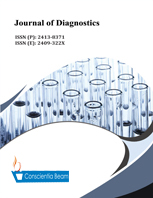Retrospective Study on Outcome of In-Patient Treatment of Severe Acute Malnutrition in Jimma University Specialized Hospital from September 2011-September 2012
DOI:
https://doi.org/10.18488/journal.98/2014.1.1/98.1.18.27Abstract
Background: Malnutrition often affects young children and contributes to more than 60% of deaths in children in developing countries. Aggressive hospital based management of sever acute malnutrition is recommended to meet the acceptable standards regarding outcome of the treatment. This study aimed to assess the treatment outcome of severely malnourished children treated in Jimma university specialized hospital (JUSH). Methods: Retrospective reviews of charts of severely malnourished children admitted at JUSH from September 2011 to September 2012 were made. In this study, a total of 173 cards were selected using systematic sampling technique. The numbers of discharges cured, defaulted, and average length of stay in days (d) were reviewed. Multivariate logistic regression was applied to identify and control potential confounders. P-value < 0.05 was considered significant. Results: Of 173 cases of malnutrition, 53.2% (92) had kwashiorkor and 30% (52) were Marasmic cases. Of the total, 87% (152) were cured while 5.8% (10) had died. The average length of stay was around 21 days. The study revealed significant association between age distribution and type and outcome of malnutrition. Association is also evident between presence of associated medical illness and duration of stay (p < 0.05). Conclusion and recommendation: In conclusion, the overall recovery, defaulter and mortality rates were within the acceptable range of sphere standards. Thus, the in-patient program was effective. However, more should be done to improve treatment outcome along with duration of stay by working aggressively on management of medical associated problems.

